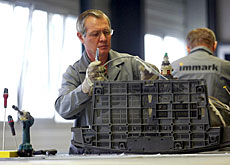Swiss firms react slowly to ageing workforce

Switzerland lags behind other European countries in dealing with the challenges posed by an ageing workforce, a study by employment agency Adecco reveals.
A barometer of eight countries shows that only French firms are less prepared than the Swiss to adapt. Switzerland, like its European neighbours, has a shortage of workers and a creaking pension scheme.
By 2010 some 55 per cent of the Swiss workforce will be over 40, Adecco said in its report on Tuesday.
Looking further ahead, the International Labour Organization predicts that the proportion of Swiss workers aged 50-64 will increase by more than a third between 2000 and 2020. In the same period, the number of employees aged 30-44 will decline by 20 per cent.
But almost half of the Swiss firms surveyed by the Adecco Institute think tank said they had put no thought at all into the subject and 60 per cent had no idea of the age make-up of their workforce.
The Demographic Fitness Index asked 500 Swiss firms what plans they had to keep older employees up to date with new technology, encourage such people to share their experiences, create a healthier environment and enhance intergenerational cooperation.
Marking each country from 100 to 400, Switzerland scored 174 points compared with an average of 182. Only France fared worse with 172, while British firms notched up a best score of 189 points.
Possible to catch up
Michael Agoras, managing director of Adecco Switzerland, told swissinfo that Switzerland’s poor performance could be put down to the relatively high proportion of small companies in the country that did not have the resources to research the issue.
However, he believes that the score will quickly improve as smaller firms can adapt faster than their big counterparts.
“We have already passed the first step of making companies aware of the changing demographics of the workplace,” he said.
“Next we have to explain which measures they need to develop to improve the situation. In one sense it is easier to develop programmes in smaller companies because they are more flexible and less cumbersome.”
He warned that any firm that ignores the challenges of the ageing workforce will inevitably lose out on innovation, productivity and efficiency.
Longstanding debate
The ageing workforce issue has been debated in Switzerland for some time. Last year the Swiss Employers’ Association recommended the introduction of flexible retirement ages and part-time work.
The Swiss Trade Union Federation wants the option of retirement from the age of 62 onwards rather than the current fixed ages of 65 for men and 64 for women.
Wolfgang Clement, head of the Adecco Institute, said the differences between the companies surveyed were small but Europe lagged behind the US.
“The issue of health management, such as lifestyle and dietary advice for workers, is a huge issue in the US but it barely makes a dent in Europe,” he said.
swissinfo, Matthew Allen in Zurich
The Swiss population is expected to peak at 8.2 million in 2036 before falling to 8.1 in 2050, according to a 2006 Federal Statistics Office report.
The number of people aged 65 and over will increase by 90% in the same period to 2.2 million people – or 27% of the population.
The retirement age for men in Switzerland is 65 and 64 for women. Trade unions have recently called for a flexible system allowing people to retire at 62, but Interior Minister Pascal Couchepin has suggested raising the age to 67.
The Adecco Institute Demographic Fitness Index compared the awareness of the ageing workforce and planned measures to adapt to the issue among 4,000 firms in eight countries: Britain, Germany, France, Spain, Italy, the Netherlands, Belgium and Switzerland.
The Swiss survey contained a higher proportion of small and medium-sized enterprises (75%) to reflect the country’s corporate landscape.
Some 20% of all Swiss firms scored the minimum 100 points on the index, with just 5% achieving 300 or above.

In compliance with the JTI standards
More: SWI swissinfo.ch certified by the Journalism Trust Initiative




You can find an overview of ongoing debates with our journalists here. Please join us!
If you want to start a conversation about a topic raised in this article or want to report factual errors, email us at english@swissinfo.ch.